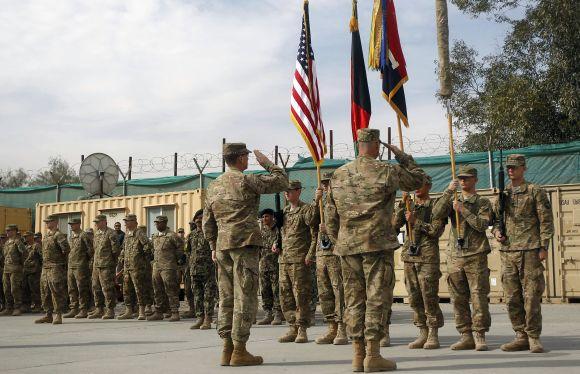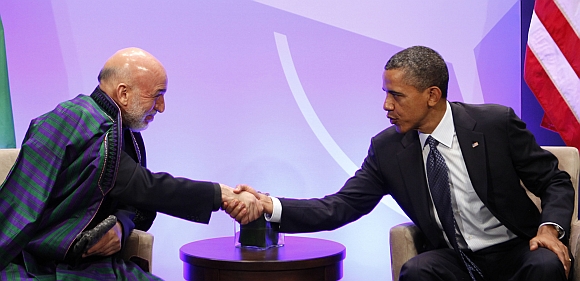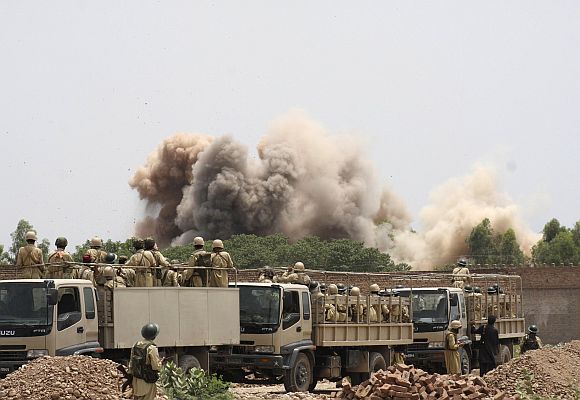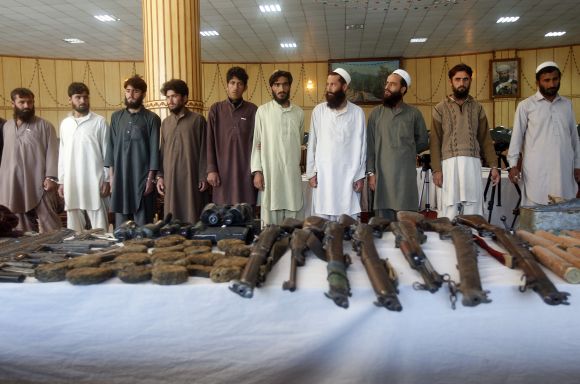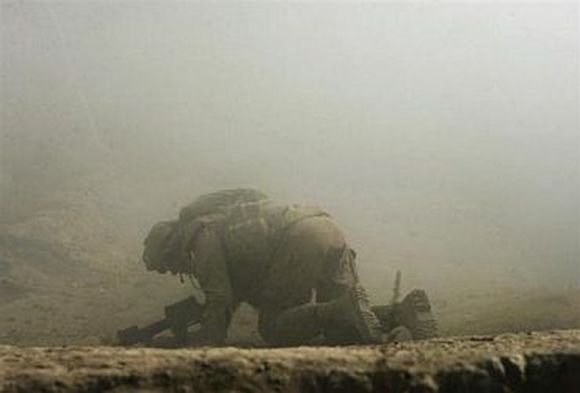 | « Back to article | Print this article |
The Afghan endgame: India's biggest challenge
As the US readies to withdraw from the Afghan battlefield, it is moving closer to Pakistan to manage the post-withdrawal scenario.
For India, it is a dangerous development fraught with serious security implications. Delhi needs to draw up contingency plans to deal with the situation, says retired Ambassador M K Bhadrakumar.
India's biggest foreign policy challenge in 2013 is likely to be the endgame in Afghanistan. The withdrawal of Western troops from Afghanistan will accelerate through the coming year and there are dark forebodings about the consequent security vacuum.
Ideally, the troop withdrawal by the North Atlantic Treaty Organisation should have been predicated on an Afghan settlement. But that was not to be, largely because the United States and Pakistan were at loggerheads -- although there was wide international acceptance that the Taliban needed to be reconciled and brought into Afghan mainstream politics.
India's worst fears with regard to the situation in Afghanistan are probably coming true. The US was India's closest partner on Afghanistan up until very recently, but Washington lately began making overtures to Pakistan to putting together a new regional condominium.
The intense period of the US-Indian dalliance culminated in the 'trilateral' that the two countries held with Afghanistan in New York in September. Unsurprisingly, it coincided with a low point in the US-Pakistan and Afghan-Pakistan relationship.
Please click NEXT to read further...
Delhi is becoming peripheral to the Afghan settlement
Whether the US's 'psywar' on the Pakistani generals worked or not is uncertain -- it is unlikely to have worked since they are au fait with American traits of behaviour -- but anyhow, Washington and Islamabad have had a remarkable reconciliation lately and the old allies are back together again in a renewed enterprise to fix the Afghan problem.
There has been a big shift in the US approach towards Afghanistan. The US is showing an abject willingness today to outsource to Pakistan the reconciliation process with the Taliban.
This shift in the US policy has created a new dynamic in the Afghan endgame. Pakistan has responded with alacrity by releasing 18 Taliban prisoners.
A de facto 'core group' of the US, Pakistan and the Kabul government with an outer circle comprising Turkey, Qatar and Saudi Arabia has taken shape.
Britain, as usual, is hovering somewhere in the shade playing indeterminate but critical roles underpinning the US strategy. In fact, Britain played a sensitive role in healing the US-Pakistan rift.
To be sure, Delhi watches the heavy Pakistani involvement in the Afghan endgame with some degree of trepidation, but Washington is pressing ahead regardless, and has already ceded a significant degree of control over the reconciliation process to Islamabad.
This is happening just as India's ties with Pakistan have also run into difficulty. Put differently, the fizz has gone out of the India-Pakistan dialogue once it transpired that Prime Minister Manmohan Singh has no immediate plans to visit Pakistan, and, more important, that Delhi is not inclined to conclude any major agreements with Islamabad on any of the so-called 'do-able' issues (such as Sir Creek).
In fact, on Siachen, India's position has even 'hardened'. Seasoned Pakistani observers won't fail to estimate that nothing much needs to be expected out of the dialogue till the general election is held in India and a new government ushered in.
Meanwhile, historically speaking, the two tracks -- the US-Pakistan relationship and India-Pakistan tensions -- have always had a co-relation. The All Parties Hurriyat Conference leader Mirwaiz Omar Farooq was not off the mark when he reminded Delhi last week following his recent visit to Pakistan that there is a link between the endgame in Afghanistan and the situation in Kashmir.
Be that as it may, Delhi feels the impact of the US' volte face already, with Washington no longer interested in putting pressure on Islamabad to bring the Pakistani perpetrators of the 2008 Mumbai terrorist attacks to justice. Washington is stonewalling India's requests for the extradition of two key protagonists who are in the US jails -- David Headley and Tahawwur Rana -- and recently administered a 'shock therapy' to the Indian security establishment by snapping back that Pakistan's Inter-Services Intelligence enjoys immunity from prosecution by a foreign country, being a State organ!
Evidently, the ISI is the single-most important influence on the Afghan Taliban and Washington cannot do without its help and cooperation in the coming two year period.
Suffice to say, as the 'core group' gets cracking on the reconciliation talks, Delhi will have not a few bitter pills to swallow in the coming year.
Delhi is becoming peripheral to the Afghan settlement, whereas Pakistan has bounced back as the US's indispensible partner on the regional chessboard.
Please click NEXT to read further...
The US cannot do without the ISI in Afghanistan
The bottom line is that it is only Pakistan which is capable of rendering help to Washington by facilitating the movement of the Taliban representatives to meet the Afghan government officials in Saudi Arabia and to sit down with American diplomats in Qatar in the coming weeks and months.
The American commentators give the spin that Pakistan has had a genuine change of heart and is now prepared to play a constructive role in negotiating an Afghan settlement.
The Washington Post columnist David Ignatius, who is no stranger to the US establishment thinking, wrote last week, 'Knowing that the US combat role is ending, the Pakistanis have concluded that a civil war across their border isn't in their interest. So they've reached out not just to the Afghan government but to the Northern Alliance, a bloc led by ethnic Tajiks, which is the leading adversary of the Taliban and its Pashtun followers.'
According to the new thesis, Islamabad has realised that: a. so long as the Afghan war continues, Pakistan too will remain unstable and, therefore, only an Afghan settlement can resolve its own conflict with its own (Pakistan Taliban) insurgents; b. an enduring Afghan settlement needs to be riveted to a broad-based power sharing arrangement that accommodates all Afghan groups; and, c. the peace dividends are so much more to Pakistan's strategic advantage than a continued pursuit of the military option of supporting the Taliban.
Whether this is a genuine assessment or a willing suspension of disbelief borne out of a desperate need to grasp a straw is hard to tell, but Washington is inclined to give the benefit of doubt to Islamabad, as apparent from the gesture to release $700 million for the Pakistani military as a goodwill gesture.
In fact, the US rhetoric on Pakistan has transformed overnight.
The fact that the United States Congress is cooperating with the administration's decision shows that there is a broad consensus in the Washington political establishment regarding the centrality of Pakistan in the American regional strategies.
The nomination of Senator John Kerry as the new US secretary of state has also raised Pakistan's comfort level regarding the US's intentions.
Indeed, the US's options are limited, too. As of December 26, 2,040 members of the US military had died in Afghanistan and 18,154 US servicemen have been wounded in hostile action.
A new report by the Government Accountability Office in Washington has estimated that the US has spent nearly $600 billion on the Afghan war and even the troop withdrawal through 2013-2014 will cost an additional $5.7 billion.
No doubt, these are weighty compulsions working on the US administration's sense of urgency that the Afghan war should be wound up without any delay, no matter the apparent imponderables in the way.
As Walter Pincus wrote in the Washington Post last week, 'it's worth taking a moment to realise that the costly Afghan operation is going on a credit card, along with the $1 trillion or more spent in Iraq.'
This is where Pakistan's cooperation becomes an imperative need for Washington. Interestingly, the GAO report also revealed that the US military needed to evacuate more than 750,000 major items worth more than $36 billion in Afghanistan. A very substantial portion of this materiel exiting Afghanistan will have to use the Pakistani route.
It doesn't need much ingenuity to conclude that a 'double dependency' is developing: On the one hand, the US expects Pakistan to facilitate its troop withdrawal from Afghanistan by providing secure transit routes to Karachi port, while on the other hand, it keenly expects Pakistan's help to bring the Taliban to the negotiating table so that a settlement in Afghanistan is possible by end-2014 that could enable President Barack Obama to claim an orderly end to the US's Afghan war.
Please click NEXT to read further...
The ISI prefers a splintered Taliban
Against this complex backdrop, it should not come as surprise that the so-called Peace Process Roadmap to 2015, which is notionally attributed to the Afghan High Peace Council (and which manifestly enjoys the support of Islamabad and Washington), is riddled with serious contradictions.
The roadmap proposes a 'five step process' (with the first phase ending with 2012) during which the focus has been on 'securing the collaboration of Pakistan' to get the Taliban to the negotiating table, and on fleshing out the future involvement of Turkey, Saudi Arabia, and UK.
Step Two will cover the coming six months in 2013 during which the effort will be to introduce 'confidence building measures' to incentivise the Taliban to talk, and with Pakistan's help to initiate a formal process of negotiations in a location in Saudi Arabia between the Kabul government and the insurgent groups.
Step Three (in the second half of 2013) will aim at reaching agreements on the priority issue of a ceasefire.
Step Four (through the first half of 2014) will consolidate the agreements reached, whereupon Pakistan will 'monitor and prevent' any breach of the agreements.
Step Five envisages bringing in the regional and international community to provide for the 'long-term security' of Afghanistan.
The idea seems to be to formalise the long-term US military presence in Afghanistan.
To be sure, the pitfalls are many. At least on six different counts, the format of the Afghan peace plan as has emerged in the roadmap becomes a high-risk enterprise.
One, the premise that the Taliban is genuinely interested in power sharing is highly debatable. We have nothing other than Pakistan's word and some odd statements by figures who claim to represent the Taliban to that effect.
Two, who indeed are the Taliban?
There are several cliques and factions within the Taliban movement, which are open to manipulation by outside forces. One main reason why the Taliban groups have splintered is that the ISI prefers things that way so that it can manipulate the movement by playing the groups against each other like puppets on a string, and, more important, the foreign powers can be prevented from directly accessing Pakistan's 'strategic asset'.
This was a tactic adopted during the Afghan jihad in the 1980s as well. The Kabul government is already sceptical about the bona fide of the so-called Taliban representatives who attended the recent Track II meet in France and has warned that it won't take part in such enterprises in the future.
Now, the sanctity of the agreements reached with the Taliban is at stake unless there is clarity about the credentials of the figures who claim to represent the Taliban.
Three, the most crucial period of the peace plan will be the one-year period starting from the middle of 2013.
Curiously, this will also be the period when the US troop withdrawal from Afghanistan will be far advanced and in political and military terms, the insurgent pressure can prove lethal.
Please click NEXT to read further...
The ISI's time-tested shenanigan: 'Talk, talk, fight, fight'
We can very well anticipate a situation with some Taliban groups negotiating while some others continue fighting and taking advantage of the security vacuum left by the US (and NATO) troop withdrawal.
In sum, the ISI will be back to its time-tested shenanigan of 'talk, talk, fight, fight'.
That is to say, the Taliban (and Pakistan as their mentors) will be negotiating from a position of strength. By that time, the US will be rather desperate to reach a settlement so that Obama can claim 'victory'.
Four, the United Nations has been practically sidelined in the Roadmap except as a convenient errand boy, while a clutch of countries -- the UK, Saudi Arabia, Turkey, Qatar -- have been brought in from nowhere as the charioteers of the peace process along with the US.
No one has explained who on earth has invested this strange clutch of countries with such special prerogatives to preside over the Afghan peace process.
These countries don't even belong to the region where Afghanistan is situated.
What is even more disconcerting is that it is this very same cabal of States that is most active today in destabilising Syria as part of the West's geopolitical agenda in the 'New Middle East'.
Five, has Pakistan had a genuine change of heart and is no longer projecting power into Afghanistan in terms of its strategy to gain 'strategic depth'?
No one can affirm with certainty -- not even the naive American commentator. Ironically, even thoughtful, experienced Pakistani commentators are not convinced that the Pakistani military leadership (which calls the shots on Afghanistan) has jettisoned its old mindset.
Arguably, there is always the temptation to put the fox in charge of the sheep pen.
After all, the outsourcing holds the tantalising potential to encourage the fox to feel 'responsible' for the welfare of the sheep. But then, the fox is also inherently interested in making a great meal out of the sheep under its protection. The analogy is quite applicable here.
Anyone who knows Pakistan would know that the more things appear to change in that country under representative rule, the more they remain the same.
Equally, the Pakistani military would be aware that it has brilliantly out-manoeuvred the US -- which isn't surprising because Pakistan has hardly any leeway to compromise over the Afghan problem where its vital interests are at stake such as the sanctity of the 2,500-kilometre long Durand Line and the explosive mix of Pashtun nationalism.
Therefore, as 2013 progresses and Obama becomes more and more desperate for a ceasefire in Afghanistan, the US position at the negotiating table will become completely untenable.
All in all, therefore, Pakistan has come within striking distance of putting the Taliban in power in Afghanistan without having to invade that country for a second time as it did 20 years ago.
In retrospect, the chill in the US-Pak ties through 2012 has enabled the Pakistani military leadership to hunker down and simply sit out the crucial one-year period that has passed in the run-up to the NATO troop withdrawal.
Finally, looking ahead, it is conceivable that beneath the 'fog of war', the Anglo-American plan (with the Turks, Qataris and Saudis playing as sidekicks) hopes to influence and manipulate Islamist groups for geopolitical purposes.
Libya and Syria have shown the potential of Islamism in geopolitics.
An Islamist regime in Kabul (under Saudi and Qatari influence) would have its uses elsewhere in the region such as Xinjiang, Central Asia, Trans-Caucasus and Iran.
Quite obviously, the US has brought in Qatar, Saudi Arabia and Turkey to assist in the Afghan endgame with a definite geopolitical agenda in mind.
Against this backdrop of the 'Great Game', the spectre that haunts India is very specific, namely, that Pakistan may exploit its special status in the US' regional strategy to gain the 'strategic depth' it always aspired for across the Durand Line.
From the US viewpoint, it may seem a legitimate demand by Pakistan that it should be allowed have a say in the nature of the Afghan settlement that prevails in the Pashtun-dominated regions.
But from the Indian angle, it will be a dangerous development fraught with serious security implications.
Indeed, Mirwaiz Farooq spoke not a day too soon. Delhi needs to draw up contingency plans to meet terrorist threats emanating from militant groups based in southern and south-eastern Afghanistan.
